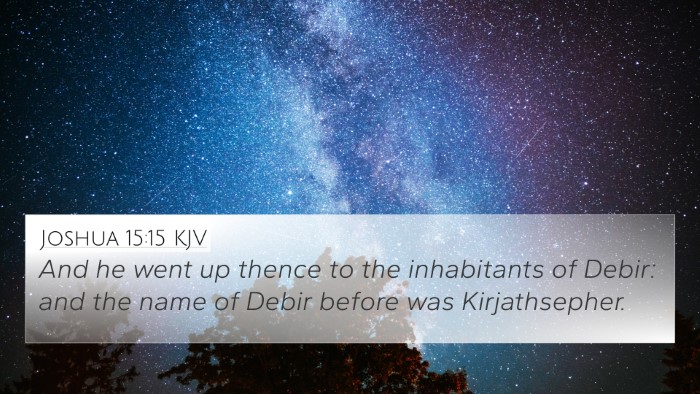Understanding Judges 1:11
Judges 1:11 states: "And from thence he went against the inhabitants of Debir: and the name of Debir before was Kirjath-sepher." This verse marks an important event in the conquest of Canaan by the Israelites, emphasizing the military campaigns led by Joshua's successors. Below, we explore its meanings, contexts, and connections to other Bible verses.
Verse Meaning and Historical Context
The passage occurs shortly after the death of Joshua, during a time when Israel was tasked with taking possession of the Promised Land. The mention of Debir and its former name Kirjath-sepher highlights the historical geography of the region, shedding light on military strategies as well as the significance of naming in biblical narratives.
Matthew Henry explains that the conquest of Debir was a demonstration of Israel's commitment to fulfill God's commands regarding the land. This reflects the broader theme of obedience and reliance on divine support during their conquests.
Albert Barnes notes that Debir was a fortified city, the capture of which would hold strategic importance for Israel as they sought to establish their presence in Canaan. The renaming of cities signifies the transition of power and the fulfillment of prophecies regarding the Land of Canaan.
Adam Clarke adds that the term Kirjath-sepher means "city of the book," suggesting connections to the history and laws given to Israel, emphasizing their identity and covenant with God. The act of conquering such cities correlates with the divine promises made to the patriarchs.
Thematic Connections
This verse has numerous connections to other scripture passages which can enhance your understanding through cross-referencing. Below are some key verses that relate to Judges 1:11:
- Joshua 10:38-39: Further details the conquest of cities in Canaan.
- Joshua 15:15: Mentions of Debir and its association with Caleb's victories.
- 1 Samuel 15:1: Discusses God’s commands regarding conquest and obedience.
- Hebrews 11:30-31: Mentions the faith of the Israelites in taking the promised land.
- Revelation 21:2: Discusses the new Jerusalem, linking themes of conquest and promise.
- Numbers 13:22: Describes the Canaanite cities and regions important for Israel’s identity.
- Deuteronomy 7:22: Emphasizes God’s guidance in removing the nations from before Israel.
Cross-Referencing Biblical Texts
To further enhance understanding, employing tools for Bible cross-referencing is beneficial. Here are a few suggestions:
- Utilize a Bible concordance to identify keywords like "Debir" and "Kirjath-sepher" for deeper studies.
- Engage in cross-reference Bible studies, which allow for thematic comparisons across different scriptures.
- Consider using a comprehensive Bible cross-reference guide for systematic study of connections.
- Refer to Bible chain references that help track the narrative and themes of conquest throughout the Old Testament.
Conclusion
Judges 1:11 serves as a vital part of Israel's history that embodies themes of faith, obedience, and divine promise. By cross-referencing this verse with other passages, one can gain a deeper understanding of the narrative and its implications in the broader context of biblical history. Engaging in a study of inter-Biblical dialogues through these connections enriches one's spiritual insights and understanding of God's unfolding plan for His people.




